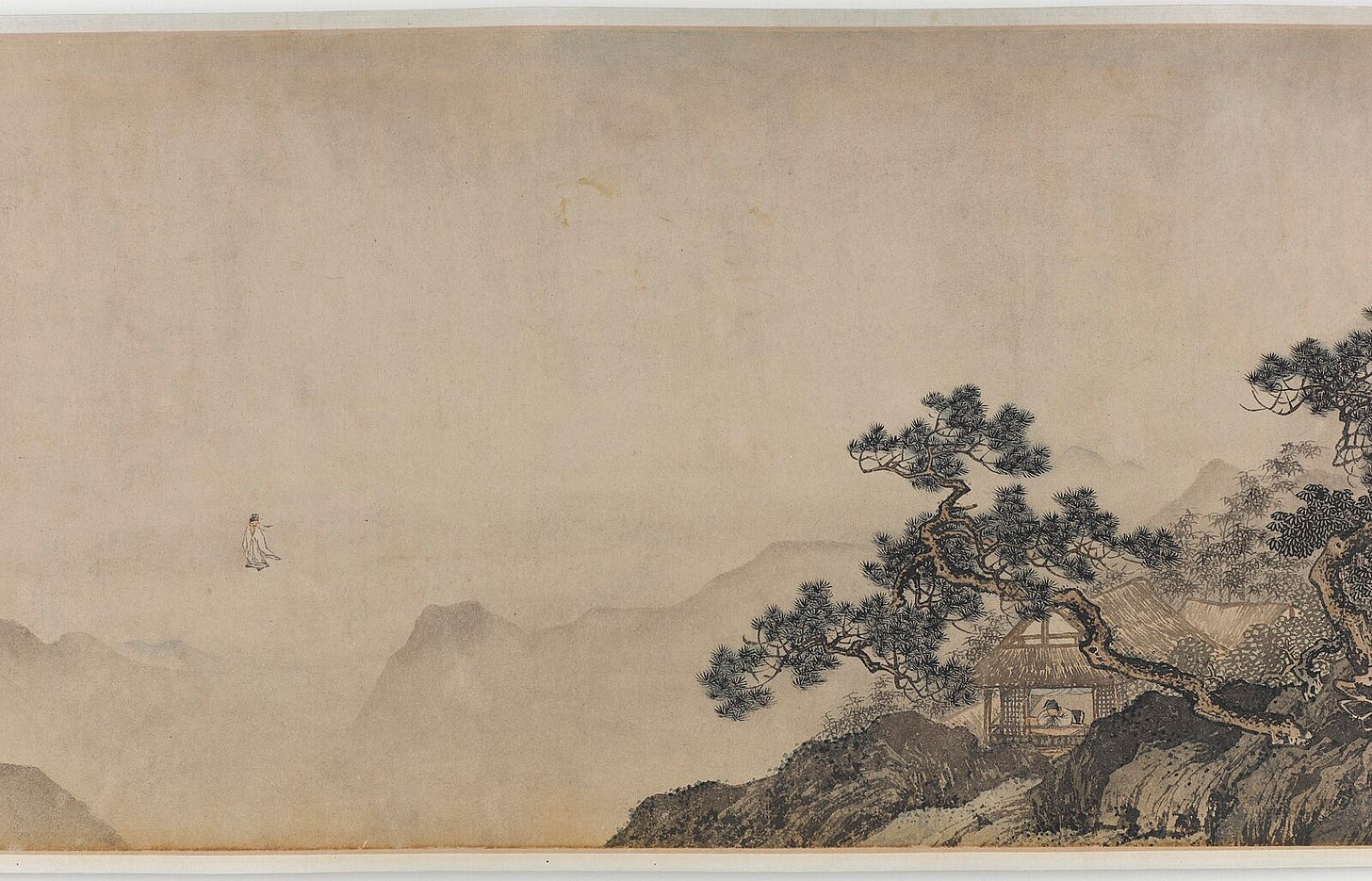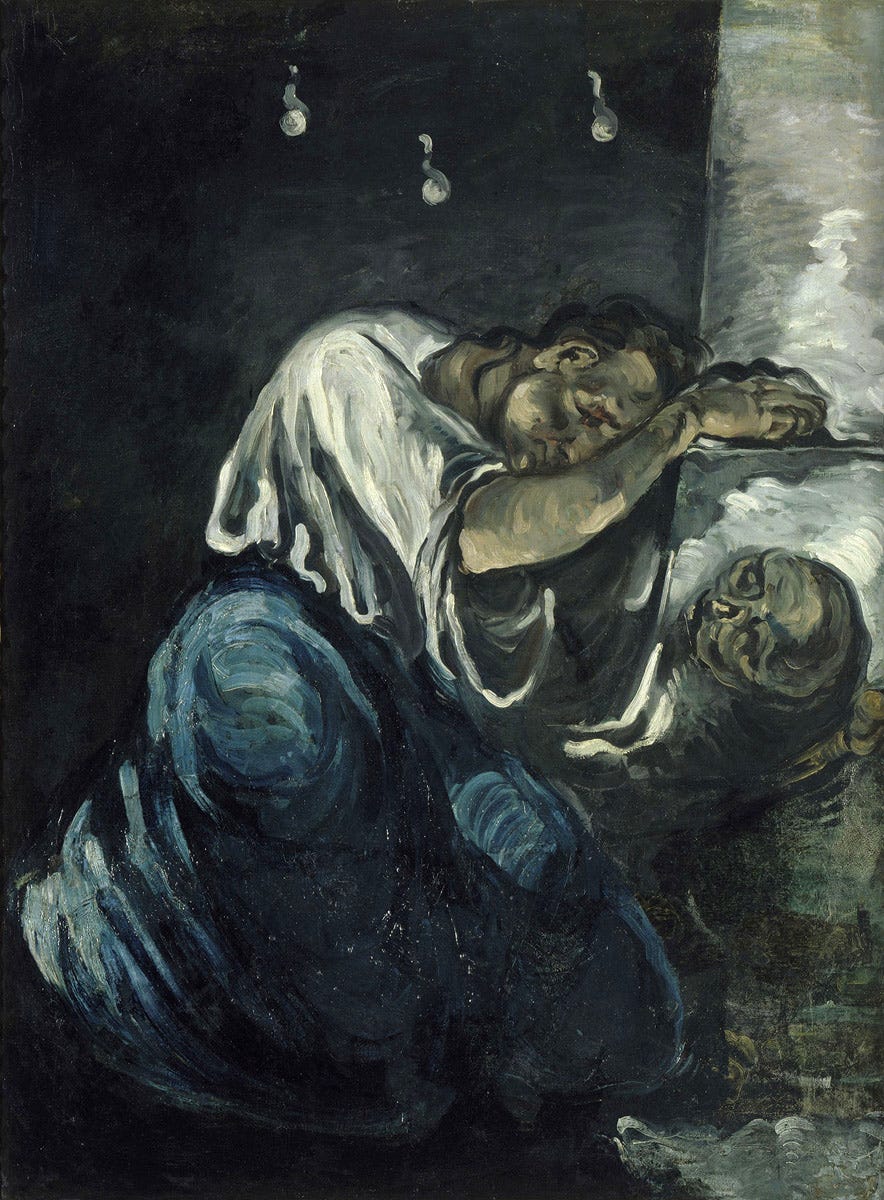As I sit down to type, I'm adjacent to the room where I was just told by my three year old son to 'go away' because 'it's Mummy's turn' to put him to bed. Sometimes, I know, a boy just needs his Mummy, but my goodness rejection can sting.
It stings particularly hard this week. After sending off a flurry of job applications in the past month, I'm dodging rejection emails like cannon fire. It seems my son too has a person specification in mind that a rival candidate* is better suited for.
Anyway, enough wallowing. It's time to go hunting for some practical advice. This is The Humanities Library turned self-help guide, and I hope it will be of service to anyone else who finds themselves routinely falling short of other people's requirements.
*This is how I'm tending to think of my wife these days - the basis for a successful marriage, I'm sure
Perspective 1 | Allow the pain of rejection to consume you
'Literature is strewn with the wreckage of men who have minded beyond reason the opinions of others.'
Virginia Woolf, A Room of One's Own, 1929
When Liriope first looked upon her son, it was clear to her that he would grow up to possess a beauty that would captivate all onlookers.
Men, women, gods and nymphs alike could barely contain themselves around Narcissus' golden hair, his soft skin, his athlete's physique. His allure enchanted all who beheld him, but nobody was more charmed than a nymph by the name of Echo.
Echo was dealing with some issues of her own. Having angered Hera by playing wing-man to her adulterous husband Zeus, she was now condemned to a life of only being able to repeat the most recent words she had heard, an affliction that was always likely to negatively impact her flirtatious advances.
Echo and Narcissus, John William Waterhouse, 1903
You know the story: Echo spies Narcissus in the woods, falls madly and immediately in love (it's the hair), and follows him to an opening by a lake. Sensing her presence, Narcissus calls out, but Echo can only repeat his words back to him. Mix-ups abound and Echo ends up launching herself at her beloved for an embrace, only to be rejected in the most brutal fashion imaginable. "Better death than such a one should ever caress me!" Ouch.
It's pleasing to remind ourselves that Narcissus gets his comeuppance, but today this is Echo's story. So what happened to her? Well, in most retellings, the pain of the rejection is all a bit too much and, overwhelmed and humiliated, she runs off into the mountains to live a life of monkish solitude and chastity. Her love was so strong, and the pain of rejection so intense, that her physical form withered away entirely, leaving behind just a voice that can still be heard in the mountains today.
Echo's tragic loss of self due to romantic rejection finds literary counterparts in Dickens' Miss Havisham, stopping the clocks in her home and refusing to change out of her wedding dress after being jilted by her fiancé, and Shakespeare's Ophelia, responding to her love Hamlet's somewhat clumsy handling of her feelings by descending into a disjointed and incoherent madness. Hey non nonny, nonny, hey nonny.
Miss Havisham, Charles Green, Second illustration for Great Expectations in the Gadshill Edition, 1898
These stories share a theme in that their characters (always female, seemingly) respond to their rejection by giving up their entire idea of selfhood. They lose their grip on the person they were, Echo giving up her physical self, Ophelia her psychological self and Miss Havisham, in refusing to countenance any future happiness, her potential self.
Perhaps the most beautiful, and my favourite, example of this sort of response to rejection is found in William Butler Yeats' When You Are Old. In this poem, the speaker vows that, despite being unrequited, his feelings will not fade for as long as his love lives. He even allows himself the tempting fantasy that she will regret having lost such authentic affection when she meets with old age.
When you are old and grey and full of sleep, / And nodding by the fire, take down this book, / And slowly read, and dream of the soft look / Your eyes had once, and of their shadows deep;
How many loved your moments of glad grace, / And loved your beauty with love false or true, / But one man loved the pilgrim soul in you, / And loved the sorrows of your changing face;
And bending down beside the glowing bars, / Murmur, a little sadly, how Love fled / And paced upon the mountains overhead / And hid his face amid a crowd of stars.
William Butler Yeats, When You Are Old, 1892
An echoing voice in the mountains, a face hiding in a crowd of stars or the 'mermaid-like' Ophelia being pulled by her clothes into a 'muddy death' in the river. There's undoubted beauty in these visions of spurned lovers - and who isn't guilty of a little romanticising of their own pain - but is there also some common biological sense here?
Ophelia, John Everett Millais, 1851-1852
According to evolutionary psychologists, the human brain developed an aversion to rejection, a response akin to physical pain, as a kind of early-warning system to increase the likelihood of engaging in behaviours favourable to acceptance by the tribe. Perhaps the frailty of our literary rejected lovers is merely biological, a fear, nested in our psyches over millennia, of being left to fend for ourselves. Next, we'll hear from someone who never seemed to share that fear of being left out in the cold.
Perspective 2 | Harden yourself against the pain of rejection
“I would advise anyone who aspires to a writing career that before developing his talent he would be wise to develop a thick hide.”
Harper Lee
Crawling like a crab from the upturned ceramic wine jar from which he begged for his living, Diogenes of Sinope would brush the dust from the hem of his tunic and add his footsteps to the thousands that beat flat the hard packed Athenian ground on the way to the agora.
His destination, however, was not to mingle with the masses amongst the smell of fish, olive oil, cattle and commerce. He turned instead to a great stone statue and fell instantly at its feet. With his hands cupped and outstretched, he could be heard yelling:
"O statue, won't you spare me some coins? Please, even a statue can grant charity I hope? Your stillness should not preclude your generosity, o silent benefactor" etc. etc.
A passing Athenian, whom I think we can forgive, thought this practice a little peculiar and stopped to ask Diogenes what on Earth he was doing. The reply, the story goes, was along the lines of: "to get practice in being refused."
Diogenes Asking for Alms, Jean-Bernard Restout, 1767
As it usually was, Diogenes' amateur street theatre was a vehicle for the putting forth of a deeper philosophical point. As a beggar, there was very little he could do to avoid rejection, it was to be an inevitable part of his life, but what he did retain control over was his response to the rejection, and if he was trained in the practice of dealing with it, he would be in a position to stop rejection from disturbing his inner peace. These teachings would later be reworked into Stoicism, the favoured philosophical school of George Washington and Gen Z TikTok influencers.
Stoicism teaches us that while we can’t control what happens to us - whether it’s another manuscript making its way back returned-to-sender, another job application being sent into the void or a date asking to go straight to the main course - we can control how we react to it.
The Stoics believed that our peace of mind comes from focusing on what we can control, namely our thoughts, actions, and attitudes, and not getting too hung up on the stuff we can’t, like other people’s opinions. As Marcus Aurelius puts it in his Meditations:
‘If you are distressed by anything external, the pain is not due to the thing itself, but to your estimate of it; and this you have the power to revoke at any moment.’
Marcus Aurelius, Meditations, c. AD 180
Guim Tió, Unreal spaces
Arthur Schopenhauer, with a little more misanthropy added characteristically into the mix, was onto something similar in his essay The Wisdom of Life:
...what goes on in other people's consciousness is, as such, a matter of indifference to us; and in time we get really indifferent to it, when we come to see how superficial and futile are most people's thoughts, how narrow their ideas, how mean their sentiments, how perverse their opinions, and how much of error there is in most of them; when we learn by experience with what depreciation a man will speak of his fellow, when he is not obliged to fear him, or thinks that what he says will not come to his ears. And if ever we have had an opportunity of seeing how the greatest of men will meet with nothing but slight from half-a-dozen blockheads, we shall understand that to lay great value upon what other people say is to pay them too much honor.
Arthur Schopenhauer, The Wisdom of Life, 1851
Perspective 3 | Use rejection as a source of growth
Standing just to the side of the village shrine stood an ancient serrate oak tree. It towered above the hills, its lowest branches a full eighty feet above the ground. It was broad enough to shelter several thousand people, and amongst the villagers gathered on one particularly sunny afternoon was a carpenter and his apprentice.
A tree, useless or otherwise, from The Thatched Hut of Dreaming of an Immortal, Tang Yin, Ming dynasty
The apprentice was gazing up at the tree in awe, wondering for the life of him why his Master seemed to overlook the beautiful branches which - he thought - would have made for very fine boats indeed. The answer he got was this:
"It’s a worthless tree! Make boats out of it and they’d sink; make coffins and they’d rot in no time; make vessels and they’d break at once. Use it for doors and it would sweat sap like pine; use it for posts and the worms would eat them up. It’s not a timber tree—there’s nothing it can be used for. That’s how it got to be that old!”
The story doesn't finish there. Later that evening, after he had returned home, the tree appeared to the carpenter in a vision, keen, it seems, to explain his tree-wisdom:
"What are you comparing me with? Are you comparing me with those useful trees? The cherry apple, the pear, the orange, the citron, the rest of those fructiferous trees and shrubs—as soon as their fruit is ripe, they are torn apart and subjected to abuse. Their big limbs are broken off, their little limbs are yanked around. Their utility makes life miserable for them, and so they don’t get to finish out the years Heaven gave them, but are cut off in mid-journey. They bring it on themselves—the pulling and tearing of the common mob. And it’s the same way with all other things. As for me, I’ve been trying a long time to be of no use, and though I almost died, I’ve finally got it. This is of great use to me. If I had been of some use, would I ever have grown this large?"
Chuang Tzu, Basic Writings (trans. by Burton Watson), 1996
It's no wonder trees are associated with wisdom. The cheeky old oak in Chuang Tzu’s foundational Taoist text had stumbled across some pretty timeless knowledge: if you're seen in the eyes of others as being completely useless, it can relieve you of the stress and sacrifice of serving any functional purpose. Rejection, in this sense, seems to serve the purpose of providing relief from toil, allowing us the room to grow old and wise (unbeknownst to me, I'd been playing the long game all along.)
Emily Dickinson was another who was alive to the glorious advantages of not being needed. Here she is on fame and adulation:
I’m Nobody! Who are you? / Are you – Nobody – too? / Then there’s a pair of us! / Don't tell! they'd advertise – you know!
How dreary – to be – Somebody! / How public – like a Frog – / To tell one’s name – the livelong June – / To an admiring Bog!
Emily Dickinson, I'm Nobody, Who are You? 1891
Automat, Edward Hopper, 1927
But rejection not only allows us space to grow, it can also be the source of that growth. Ralph Waldo Emerson writes about this in his essay Friendship, championing the growth and self reliance that comes from facing challenges, especially rejection:
‘Dear to us are those who love us... but dearer are those who reject us as unworthy, for they add another life; they build a heaven before us whereof we had not dreamed, and thereby supply to us new powers out of the recesses of the spirit, and urge us to new and unattempted performances.’
Ralph Waldo Emerson, Friendship, 1841
The Magdalen, or Sorrow, Paul Cézanne, 1868-1869
The chief message of this conceptualisation of rejection is that it is nothing to be afraid of. We can analyse it and improve or we could reject it and double down - either way we have learnt something and we have grown. Joyce was a fearless writer who suffered his own share of rejection and even ridicule; here he is in The Portrait:
‘You made me confess the fears that I have. But I will tell you also what I do not fear. I do not fear to be alone or to be spurned for another or to leave whatever I have to leave. And I am not afraid to make a mistake, even a great mistake, a lifelong mistake and perhaps as long as eternity too.’
James Joyce, A Portrait of the Artist as a Young Man, 1916
Whether we end up using the negative opinions of others to grow from, or we ignore them entirely, the important thing is to continue to do something, especially if that thing - writing the next great novel, being a comforting presence to a child in need of sleep - adds beauty to the world.
In Arthur Machen's The Hill of Dreams, his protagonist Lucian Taylor is a sensitive writer who becomes increasingly obsessed with his inner world and artistic ambitions. His thoughts place the pursuit of beauty against life's baser concerns, and I'll let them be our final ones:
‘It was better, he thought, to fail in attempting exquisite things than to succeed in the department of the utterly contemptible.’
Arthur Machen, The Hill of Dreams, 1907












Thank you so much for this Substack! Definitely one of my top favourites so far. I’ve been subject to a lot of rejection and defeat during the last couple months and have, too, found solace in Greek and Chinese philosophy. I find that strife, if not used to flourish, can also be used to add an artistic flavour to one’s writing (as is observed with many writers throughout history). Therefore, I cannot see any of us emerging from these experiences without increased strength in every aspect. Blessed luck to you in all your endeavours!
The last quote...the crevace that awaits my daily decision.